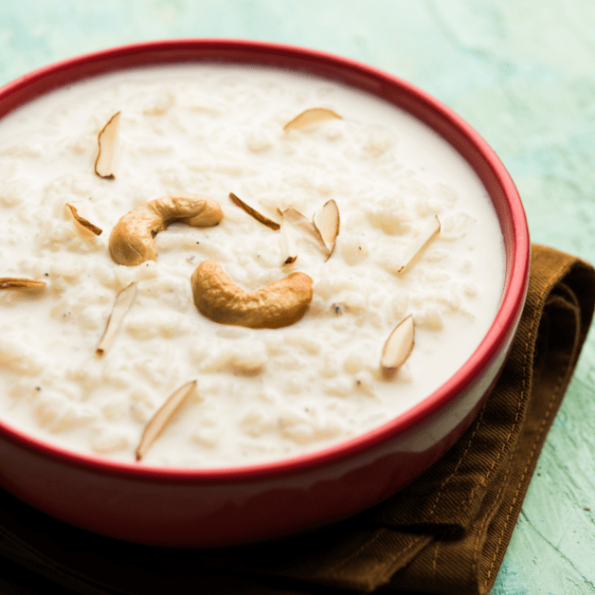Paal Payasam Recipe (Milk and Rice Pudding) Easy Instant Pot Way

What is Paal Payasam?
Paal Payasam is a delicious and sweet treat from South India that will make you smile! It's a lot like rice pudding and is made with milk, rice, and sugar. This dessert is super special and is often made for big celebrations and festivals like birthdays or holidays in India.
The Story Behind My Paal Payasam
Paal Payasam is a beloved dish that I often cook and offer to my deities on special occasions. It holds a special place in my heart, as it serves as a comforting treat after a heavy meal. The creamy and sweet flavors bring back childhood memories, reminding me of the warmth and love shared during family gatherings.
This dish is all about sharing and brings a sense of joy and togetherness. As a child, we used to count the cashews in our bowls of payasam, believing that the person with the most cashews was God's favorite. Although these stories were just fantasies, I still love the taste of cashews soaked in the creamy kheer, as they add an extremely delicious touch.
This recipe is a traditional one in my family, passed down through generations. However, I've adapted it to use a pressure cooker method to save time. This way, everyone can enjoy this delightful dessert without worrying about the lengthy process of cooking rice in milk by slow simmering.
My method is easy and accessible, allowing anyone to prepare Paal Payasam, even on busy Monday mornings or during festive occasions. With many preparations during festivals, it's important not to miss out on this kheer simply because of its time-consuming traditional method. Enjoy more of this sweet treat with my quick and efficient recipe!
How to Make Paal Payasam at Home?
- Cooking on the Stove: Traditionally, Paal Payasam is cooked slowly on the stove. You cook the rice and milk together for a long time until it becomes creamy and delicious. It’s like watching a magic potion turn into a yummy dessert!
- Pressure Cooker Shortcut: There’s a quicker way to make it using a pressure cooker, which makes the milk thick and rich, just like magic! It’s like a little kitchen trick that makes everything faster.
- Key Ingredients Paal Payasam
- Rice: The main ingredient that gives Paal Payasam its body. Typically, a short-grain rice like sona masuri or basmati is used.
- Milk: Full-fat milk is preferred for its richness, which gives the payasam its creamy texture.
- Sugar: Adds sweetness, balancing the rich flavors of the milk and rice.
- Cardamom: This spice adds a warm, aromatic flavor that enhances the overall taste.
- Nuts and Raisins: Often garnished with roasted cashews and raisins, adding a nutty crunch and sweetness.
Paal Payasam is a classic South Indian dessert made from rice, milk, and sugar. Known for its creamy texture and rich flavor, this dish is a staple at festivals and special occasions across Tamil Nadu, Kerala, and other South Indian states. Here's a detailed description of this beloved sweet
- 1 handful Raw Rice
- 1.5 liters Full Cream Milk
- 1/2 cup Sugar
- 1 teaspoon Saffron Strands
- 1 tablespoon Cashews
- 1 teaspoon Ghee
- 1. Fry Cashews:Take a big pressure cooker and add a teaspoon of ghee to it.Fry the broken cashews in the ghee until they turn golden brown. Remove them and set aside for later garnishing.
- 2. Roast the Rice:In the same ghee, add the rice and roast it for just 1 minute on medium flame. This step speeds up the cooking process by making the rice more absorbent.
- 3. Add Milk and Boil:Pour 1 liter of milk into the pressure cooker with the rice. Bring it to a boil, stirring occasionally to prevent the milk from sticking to the bottom.Keep aside half a liter of milk for later use.
- 4. Soak the Saffron:Take a tablespoon of the hot milk from the cooker and soak the saffron strands in it. This will release the color and aroma of the saffron, enhancing the payasam.
- 5. Pressure Cook:Once the milk starts boiling, close the pressure cooker with the lid.Observe the steam: You should notice a mild steam coming through the vent. At this point, put on the whistle and reduce the flame to the lowest setting.Simmer the flame completely and allow the mixture to cook. It won’t whistle due to the low flame, allowing you to relax and attend to other tasks. Do not increase to medium or high flame to prevent burning or overcooking.Notes:Cooking Temperature-Keep the flame low when cooking Paal Payasam. Do not let the cooker whistle by keeping it on medium or high flame, as the milk will overflow and create a mess.
- 6. Finish Cooking:After 30 minutes, turn off the stove and wait for the pressure inside the cooker to release naturally.Open the lid carefully: You will see that the rice has cooked beautifully and absorbed the milk, creating a thick consistency.
- 7. Final Touches:Mash the rice slightly with the back of a ladle to make the texture smoother.Add sugar and the remaining milk: Mix well and bring the mixture to a quick boil for just a minute. This step is optional, as it adds sweetness and richness.Garnish with saffron and fried cashews before serving.
Servings 5
- Amount Per Serving
- Calories 276kcal
- Calories from Fat 108kcal
- % Daily Value *
- Total Fat 12g19%
- Saturated Fat 7g35%
- Cholesterol 41mg14%
- Sodium 99mg5%
- Potassium 403mg12%
- Total Carbohydrate 33g11%
- Dietary Fiber 0.1g1%
- Sugars 24g
- Protein 9g18%
- Vitamin A 418 IU
- Calcium 322 mg
- Vitamin D 3 IU
- Phosphorus 270 mg
- Magnesium 34 mmol
* Percent Daily Values are based on a 2,000 calorie diet. Your daily value may be higher or lower depending on your calorie needs.
Serving Suggestions:
- Enjoy Paal Payasam warm as a comforting dessert or serve it chilled for a refreshing treat.
- Perfect for special occasions: This dish is ideal for festivals, family gatherings, or as a sweet offering during religious ceremonies.
Variations
While traditional Paal Payasam is made with rice, there are variations that use other ingredients:
- Vermicelli Payasam: Uses thin noodles instead of rice for a different texture.
- Aval Payasam: Made with flattened rice (poha) for a quicker version.
- Sabudana Payasam: Uses tapioca pearls for a chewy texture.
Expert Tips
- Soaking the Rice: For best results, soak the raw rice in water for 30 minutes before cooking. This helps the rice cook faster and become softer.
- Adjusting Consistency:Paal Payasam tends to thicken as it cools. Simply add more milk to achieve your desired consistency before serving.
- Pouring Milk Safely:When adding milk to the hot pressure cooker, pour it slowly from the side. This prevents steam from suddenly escaping and potentially burning you.
- Cooking Temperature:Keep the flame low when cooking Paal Payasam. Do not let the cooker whistle by keeping it on medium or high flame, as the milk will overflow and create a mess.
- Scaling for Large Gatherings:This recipe can easily be increased for parties or family functions. Use a larger pressure cooker (12 or 15 liters) and double or triple the ingredients. Increase the cooking time to 40-45 minutes. If the cooker whistles during cooking, turn it off for 5 minutes, then continue simmering for the remaining time.




